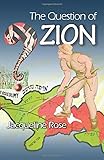The Question of Zion / Jacqueline Rose.
Material type: TextPublisher: Princeton, NJ : Princeton University Press, [2007]Copyright date: ©2005Edition: Course BookDescription: 1 online resource (232 p.)Content type:
TextPublisher: Princeton, NJ : Princeton University Press, [2007]Copyright date: ©2005Edition: Course BookDescription: 1 online resource (232 p.)Content type: - 9780691130682
- 9781400826520
- online - DeGruyter
- Issued also in print.
| Item type | Current library | Call number | URL | Status | Notes | Barcode | |
|---|---|---|---|---|---|---|---|
 eBook
eBook
|
Biblioteca "Angelicum" Pont. Univ. S.Tommaso d'Aquino Nuvola online | online - DeGruyter (Browse shelf(Opens below)) | Online access | Not for loan (Accesso limitato) | Accesso per gli utenti autorizzati / Access for authorized users | (dgr)9781400826520 |
Browsing Biblioteca "Angelicum" Pont. Univ. S.Tommaso d'Aquino shelves, Shelving location: Nuvola online Close shelf browser (Hides shelf browser)

|

|

|

|

|

|

|
||
| online - DeGruyter Hegel's Preface to the Phenomenology of Spirit / | online - DeGruyter Return to Greatness : How America Lost Its Sense of Purpose and What It Needs to Do to Recover It / | online - DeGruyter Return of the "L" Word : A Liberal Vision for the New Century / | online - DeGruyter The Question of Zion / | online - DeGruyter On Bullshit / | online - DeGruyter A Place on the Team : The Triumph and Tragedy of Title IX / | online - DeGruyter The Qualities of a Citizen : Women, Immigration, and Citizenship, 1870-1965 / |
Frontmatter -- Contents -- Preface -- Acknowledgments -- Chapter 1. "The apocalyptic sting": Zionism as Messianism (Vision) -- Chapter 2. "Imponderables in thin air": Zionism as Psychoanalysis (Critique) -- Chapter 3. "Break their bones": Zionism as Politics (Violence) -- Notes -- Index
restricted access online access with authorization star
http://purl.org/coar/access_right/c_16ec
Zionism was inspired as a movement--one driven by the search for a homeland for the stateless and persecuted Jewish people. Yet it trampled the rights of the Arabs in Palestine. Today it has become so controversial that it defies understanding and trumps reasoned public debate. So argues prominent British writer Jacqueline Rose, who uses her political and psychoanalytic skills in this book to take an unprecedented look at Zionism--one of the most powerful ideologies of modern times. Rose enters the inner world of the movement and asks a new set of questions. How did Zionism take shape as an identity? And why does it seem so immutable? Analyzing the messianic fervor of Zionism, she argues that it colors Israel's most profound self-image to this day. Rose also explores the message of dissidents, who, while believing themselves the true Zionists, warned at the outset against the dangers of statehood for the Jewish people. She suggests that these dissidents were prescient in their recognition of the legitimate claims of the Palestinian Arabs. In fact, she writes, their thinking holds the knowledge the Jewish state needs today in order to transform itself. In perhaps the most provocative part of her analysis, Rose proposes that the link between the Holocaust and the founding of the Jewish state, so often used to justify Israel's policies, needs to be rethought in terms of the shame felt by the first leaders of the nation toward their own European history. For anyone concerned with the conflict in Israel-Palestine, this timely book offers a unique understanding of Zionism as an unavoidable psychic and historical force.
Issued also in print.
Mode of access: Internet via World Wide Web.
In English.
Description based on online resource; title from PDF title page (publisher's Web site, viewed 30. Aug 2021)


